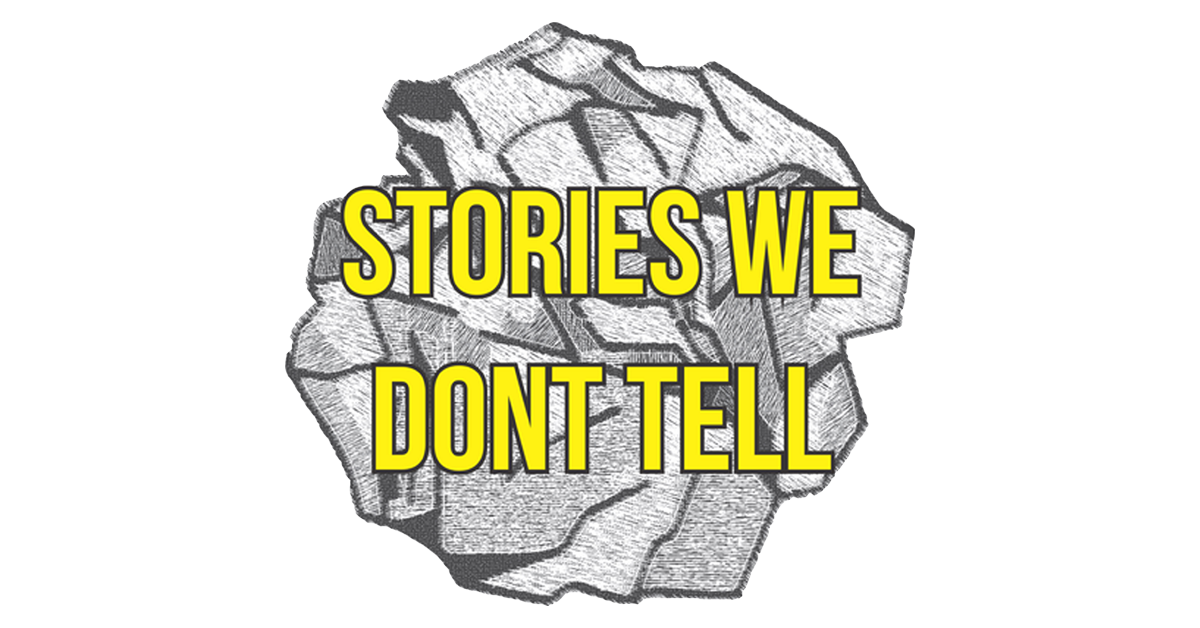This blog has been transcribed from the Stories We Don’t Tell Podcast Episode 74. Listen to that episode at this LINK or click on the image below.
Cast of Characters:
Stefan Hostetter (SH): co-founder of Stories We Don’t Tell and podcast co-host.
Paul Dore (PD): co-founder of Stories We Don’t Tell and podcast co-host.
PD: The thing about this story was that it was hard to write - not specifically from a standpoint of it's a difficult topic or at least a terribly difficult topic. I feel like you struggled with the story consistently and that you kept having iterations of versions of the story over and over and over again. And none of them exactly seem to land where you wanted them to.
SH: I think so and it was one of those instances where the background can be very long and involved. There's a lot of pieces to it. When the writing group was giving me feedback, there was a lot of talk about what details were important and what was not important. It didn't have the benefit of this as a breakup story or as a kind of universal thing that everyone's been through. You had to sort of start from scratch to form a base of what I was even talking about. I had to build up a lot of knowledge in people's minds about why any of this would make any sense and why it even matters. The story jumps around and covers the course of about a year. It's a story about a game show, but also, it’s a story about a friendship. I struggled with it for so long because I needed to decide what it was going to be about. Then did I get enough context in there for it not to be confusing and not being overwhelming? Part of the problem was - How do you convey enough information so people aren't confused? There was a danger to undercut the whole story by really just sort of giving people the sort of Coles Notes. If I just told you what happened, it doesn't really capture the essence of why it matters.
PD: The thing with bringing in either silly stuff or stuff that is absurd is finding that place where you're not confusing the audience to the point where they check out. Silliness and absurdity is great, but having enough things rooted in a story where you can still use those elements, make them effective and make them land.
SH: It was tough to find that place. I also had a need to somehow capture an essence of a friendship. But the story that was trying to capture that essence was confusing in itself. So I feel like there was never enough of an opportunity to get the through line of the essence of the friendship because it was based in these absurd things we were doing. Part of the essence of the friendship was to buy into absurdity. And so to explain the absurdity in a way that is in any way not completely baffling required a fair amount of context. The story took on a different form or focus with each re-write. It could have been a completely different story about just the game show or it could have been a completely different story about this friendship. It was hard to find how to do it together.
PD: You also wanted it to be about failure and how often we hid from it. That is a common thing people would have experience with. But then you had to explain why this particular experience was a failure. So again, there was a lot of explaining that you had to do.
SH: I was just trying to find all the pieces and make them work together. I feel like I didn’t get closure. The reason why you can't find that closure with stories like this is because there isn't really an ending.
PD: I was hoping that this would be an opportunity for you to explain the intern part, which ended up on the cutting room floor. One of those details that you loved, but that the audience didn’t really need to know.
SH: It was one of the more absurd portions of this story. We were running a set of surveys and at some point and we got profiled in our community about side projects and a message went out to the community that we were here. That community being the Centre for Social Innovation. The profile mentioned the surveys we were doing.
PD: Let me just like interject for a second. You haven't even gotten to the intern yet. That sort of illustrates what we were talking about. There's a lot of heavy lifting you have to do at the beginning just to get to the point.
SH: Yes. Someone applied to be our intern to help with the surveys. We had this ongoing back and forth trying to explain that it wasn’t a real thing. This person wouldn’t take no for an answer. This just seemed like such a perfect example of the absurdity part of the story because the whole gimmick of the entire experience was pretending we were a real thing. This was someone who bought so far into the silliness that we actually then had to like come clean and say - none of this is real. That's one of those details that got cut from the story because it’s just not relevant.
If you’re as confused as we are, use #SWDTconfused to @jeffreypauldore and @Steho_.

